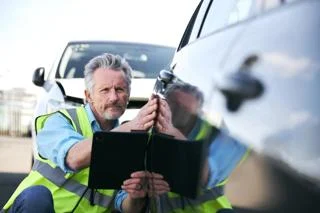If you can’t find the perfect leasing company, starting your own perhaps isn’t the most orthodox way of solving the problem. But for former procurement consultant Keith Townsend, now managing director of Agility Fleet, the approach paid off.
Twelve years on, the company he helped launch has a place in the FN50 (number 41), more than 2,500 vehicles on its risk fleet and a £10 million annual turnover.
Townsend explains: “I’ve got a background in procurement and operations management, and took a role to provide some procurement consultancy for someone running a business with around 500 vehicles.
“They were funded by a number of providers, some outright-purchased, some with maintenance agreements, but it was in a real pickle.
Factfile
Company: Agility Fleet
Headquarters: Bromsgrove
Managing director: Keith Townsend
2015 FN50 Position: 41
2015 FN50 risk fleet size: 2,596
Established: 2004
“At that point, we began to investigate setting up our own leasing company. From a buyer’s point of view, what do we really want to get from a leasing provider? I’ve been frustrated as a senior purchasing guy working in big organisations by suppliers in all kinds of industries promising the earth but not delivering.”
Townsend brought in expertise from the fleet industry to help establish the firm – initially beginning by supplying the client that inspired the business, then branching out to serve third party customers.
Today, that client is still important to Agility, but represents only 20% of its risk fleet.
Agility Fleet received the FN50 customer service team of the year award last November.
Townsend says: “We were constantly getting really good testimonials from our customers. We’ve come a long way to gain our reputation, and we’ll go even further to keep it.
“It’s someone independent saying we are as good as we think we are. Some of the factual benchmarking in the FN50 survey includes emissions, damage recharges, excess mileage charges, and it’s been really nice to see our charges are some of the lowest in the industry.”
Townsend credits much of the company’s success to a keen focus on the ‘back end’ of a contract hire deal.
“We’re very sensible with end-of-contract recharges. We assess every vehicle at our premises, we don’t use third parties. We understand that they are company cars – tools of the trade – and that their condition will reflect that.
“We won’t always be the cheapest on our rentals, but we want fleets to understand the iceberg model – all the hidden costs beneath the surface. If you consider the total cost of ownership, we should be competitive.
“We factor in the customer and the nature of their business when issuing charges. When you’ve dealt with a customer a while, you begin to understand how their vehicles tend to come back, and can set future rates accordingly. If a customer has vans in construction sites, you expect them to be in a worse condition than someone delivering flowers.”
The ‘vast majority’ of businesses supplied by Agility Fleet operate between 10 and 200 vehicles, with only a few having a dedicated fleet manager.
“We’d always had a focus on the personal way of doing things”, Townsend says. “In the majority of cases, our clients are single-source with us, but if they dual-source we are more often than not the larger player.”
Townsend explains that new customers will continue to be looked after by the new business team for at least the first 12 months of a relationship.
“It’s one of the things I got frustrated with as a buyer. You’d build up a relationship with your salesperson, then once they had your business you would be passed on to someone else” he says.
“Yes, you want a cheap rental – but everyone wants a cheap rental. You want good customer service, you want to speak to the same people every time.”
As the customer base has grown, Agility has expanded its team. It recruited a sales director just over a year ago, which Townsend described as a ‘big step’ for the firm.
The company’s expanded sales team means it can take advantage of new opportunities – it now has greater capacity to respond to tenders.
“Tenders are certainly a key part of what we’re doing going forward. We previously didn’t have the resource to put the right amount of effort in to win a tender and perhaps in the past may not have had the capacity to deal with some of the larger contract wins.
“If fleets want to go into a price fight when tendering, we don’t want to get into that. We’d much rather work with a smaller organisation where it’s not all about price.”
A reluctance to fight on price means long-term, sustainable relationships are a focus for Agility.
“We don’t just want to supply one vehicle, or one vehicle and its replacement. We want a long-term relationship. We want to make our customers lives easier”, explains Townsend.
Growing risk fleet
It’s a view echoed in his approach to growth. The business has seen good increases in its risk fleet size in recent years – 2015’s FN50 listing reports 2,596 vehicles on fleet – a 26% increase on 2014’s figure. It’s a significant increase on its 2011 figure, upon entering the FN50, with 1,339 vehicles – but Townsend insists he is not chasing numbers.
“We did a bit of courtesy car business in the last couple of years, but we’re not actively renewing those deals. Year to date, we’re ahead of target.
“We don’t want to grow with ridiculously cheap rentals as that’s just going to hurt us when they come back – we’re looking at the longer-term picture. This year is more about good retention rates, and profitable growth, but I don’t expect our FN50 figure to increase significantly in 2016’s results.”
Growth by acquisition has not been ruled out – but Townsend says it is difficult to find good acquisition targets.
“What we tend to find is brokers that are available – but we’re trying to build our risk fleet, so it’s not really what we’re interested in, and there’s not much tangible value.
“We would look for a smaller opportunity, but it’s very difficult to find small leasing businesses for sale. We have to investigate their reasons for selling, the value in their book and their maintenance plans.
“We’ve been very acquisitive in our sister training and consultancy business, and if we could do the same in fleet we’d love to.”
Commercial vehicles
Agility’s risk fleet is currently around 85% car and 15% LCV, and Townsend sees commercial vehicles as a profitable growth sector.
He adds caution, however. “It’s also a difficult sector – but we’ve made some good inroads with vans over the past couple of years, which accounts for some of our recent growth.
“Understanding what the customer needs is the key challenge. It is less price sensitive, and finance options become more interesting, getting into finance lease and contract purchase, but we’ve become better at understanding those different types of products.
“We look very carefully at unusual vehicles to ensure we’re correctly judging the residual.”
Townsend believes Agility Fleet’s approach to residuals and remarketing is one of its key areas of differentiation.
“We don’t make too much on the finance, but tend to set conservative residuals with fair contract charges.”
Agility Fleet’s average contract length is around 38 months/52,000 miles, with most of the fleet in C and D sector and very little in small cars and prestige.
Townsend says: “If you get the residual wrong in prestige it makes much more of a difference so we try and take a sensible position at the front end.
“We’ve got a really strong penetration of fully maintained vehicles, so we know the vehicles that are coming back have been looked after, and we buy maintenance through the Fleet Assist network, so we know the costs are competitive.”
Agility prides itself on the speed of turning around its well maintained, average mileage cars back into the used market.
“Our approach to remarketing is one of the reasons we can compete. We turn cars round exceptionally quickly, and with good returns. We ship very few to auction and mostly deal directly with traders.”
Vehicles still go to auction, but only in a few cases. The exceptions tend to be cars in Northern Ireland and in far-flung corners of the country.
“We know what vehicles are coming back, and try to convert the vehicles to cash generally in around a week. It’s something that we’ve always done, and we don’t get them away cheaply either.
“If we’ve had a car sitting around for two or three weeks, only then do we begin to get worried. The challenge for us is to deal with that effectively as we continue to grow.”



















Login to comment
Comments
No comments have been made yet.